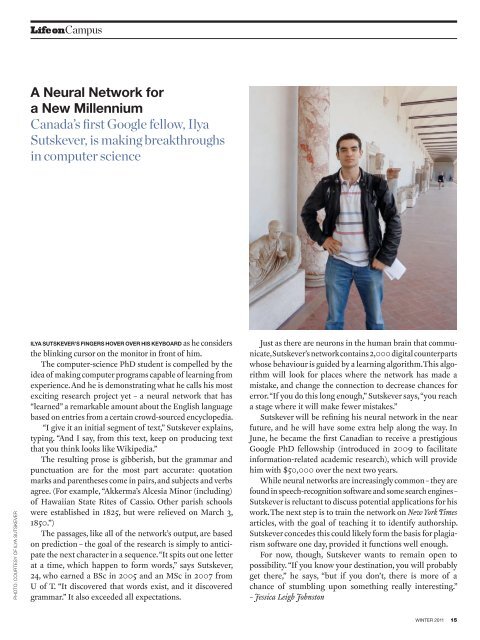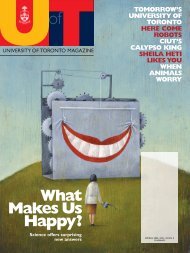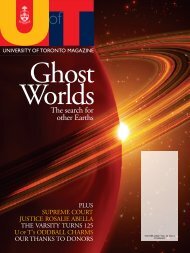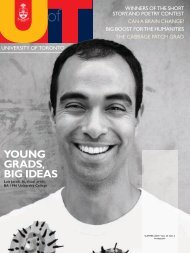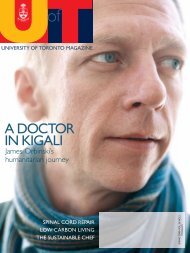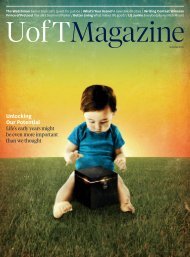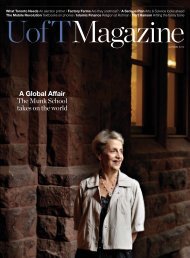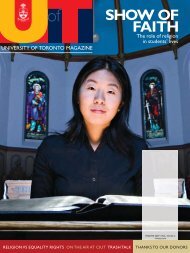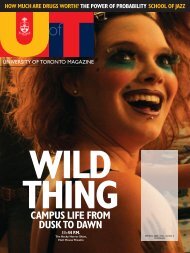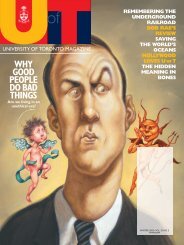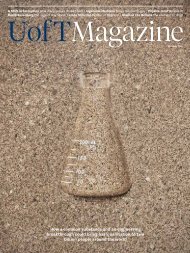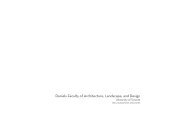The Next Big Idea 10 concepts that could - University of Toronto ...
The Next Big Idea 10 concepts that could - University of Toronto ...
The Next Big Idea 10 concepts that could - University of Toronto ...
Create successful ePaper yourself
Turn your PDF publications into a flip-book with our unique Google optimized e-Paper software.
LifeonCampus<br />
A Neural Network for<br />
a New Millennium<br />
Canada’s first Google fellow, Ilya<br />
Sutskever, is making breakthroughs<br />
in computer science<br />
photo: courtesy <strong>of</strong> ilya sutskever<br />
Ilya Sutskever’s fingers hover over his keyboard as he considers<br />
the blinking cursor on the monitor in front <strong>of</strong> him.<br />
<strong>The</strong> computer-science PhD student is compelled by the<br />
idea <strong>of</strong> making computer programs capable <strong>of</strong> learning from<br />
experience. And he is demonstrating what he calls his most<br />
exciting research project yet – a neural network <strong>that</strong> has<br />
“learned” a remarkable amount about the English language<br />
based on entries from a certain crowd-sourced encyclopedia.<br />
“I give it an initial segment <strong>of</strong> text,” Sutskever explains,<br />
typing. “And I say, from this text, keep on producing text<br />
<strong>that</strong> you think looks like Wikipedia.”<br />
<strong>The</strong> resulting prose is gibberish, but the grammar and<br />
punctuation are for the most part accurate: quotation<br />
marks and parentheses come in pairs, and subjects and verbs<br />
agree. (For example, “Akkerma’s Alcesia Minor (including)<br />
<strong>of</strong> Hawaiian State Rites <strong>of</strong> Cassio. Other parish schools<br />
were established in 1825, but were relieved on March 3,<br />
1850.”)<br />
<strong>The</strong> passages, like all <strong>of</strong> the network’s output, are based<br />
on prediction – the goal <strong>of</strong> the research is simply to anticipate<br />
the next character in a sequence. “It spits out one letter<br />
at a time, which happen to form words,” says Sutskever,<br />
24, who earned a BSc in 2005 and an MSc in 2007 from<br />
U <strong>of</strong> T. “It discovered <strong>that</strong> words exist, and it discovered<br />
grammar.” It also exceeded all expectations.<br />
Just as there are neurons in the human brain <strong>that</strong> communicate,<br />
Sutskever’s network contains 2,000 digital counterparts<br />
whose behaviour is guided by a learning algorithm. This algorithm<br />
will look for places where the network has made a<br />
mistake, and change the connection to decrease chances for<br />
error. “If you do this long enough,” Sutskever says, “you reach<br />
a stage where it will make fewer mistakes.”<br />
Sutskever will be refining his neural network in the near<br />
future, and he will have some extra help along the way. In<br />
June, he became the first Canadian to receive a prestigious<br />
Google PhD fellowship (introduced in 2009 to facilitate<br />
information-related academic research), which will provide<br />
him with $50,000 over the next two years.<br />
While neural networks are increasingly common – they are<br />
found in speech-recognition s<strong>of</strong>tware and some search engines –<br />
Sutskever is reluctant to discuss potential applications for his<br />
work. <strong>The</strong> next step is to train the network on New York Times<br />
articles, with the goal <strong>of</strong> teaching it to identify authorship.<br />
Sutskever concedes this <strong>could</strong> likely form the basis for plagiarism<br />
s<strong>of</strong>tware one day, provided it functions well enough.<br />
For now, though, Sutskever wants to remain open to<br />
possibility. “If you know your destination, you will probably<br />
get there,” he says, “but if you don’t, there is more <strong>of</strong> a<br />
chance <strong>of</strong> stumbling upon something really interesting.”<br />
– Jessica Leigh Johnston<br />
winter 2011 15


